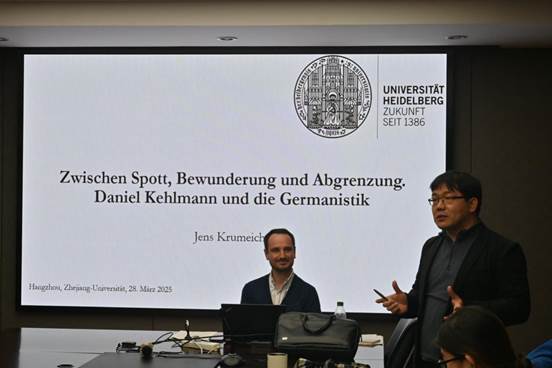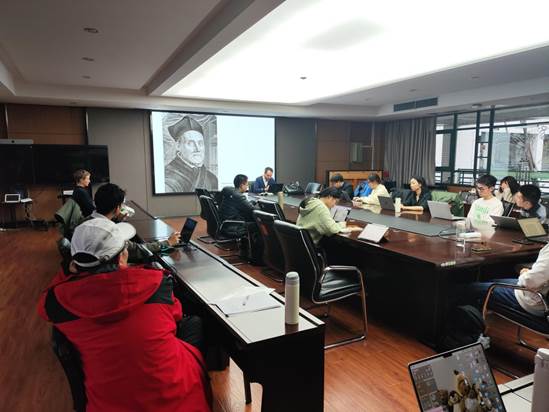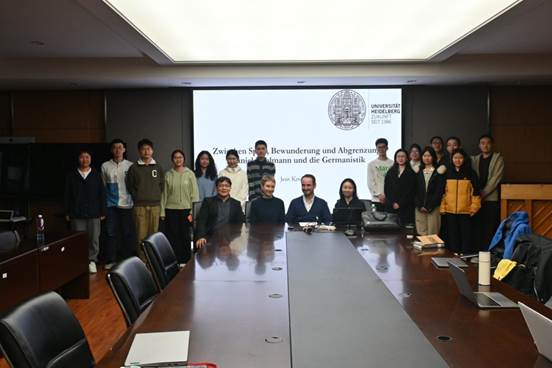On the afternoon of March 28, 2025, the 33rd session of Dong’s Academic Salon of Literature, History and Philosophy “History of Sino-German Literary Exchange,” was successfully convened. Titled “Daniel Kehlmann’s Love-Hate Relationship with Germanistics,” the lecture featured Jens Krumeich, a researcher from Heidelberg University’s Department of German Studies, as keynote speaker. Professor LIU Yongqiang, Deputy Director of the German Studies at the School of International Studies, moderated the lecture. Specially-appointed associate researcher Dr. Weijie Ring ZHAO, international faculty member Zili Zhu, and some students from the German Studies attended the lecture.
Researcher Krumeich anchored his analysis in Kehlmann’s novel Tyll, adopting an impressionistic approach to examine the author’s satirical works, essays, New York poetics lectures, teaching activities, and participation in Jonathan Franzen’s Kraus Project. Through these case studies, Krumeich explored Kehlmann’s multifaceted identity as an award-winning writer, scholar-poet (poeta doctus), public intellectual, and holder of prestigious university poetics chairs (Poetik-Dozentur), alongside his complex relationship with literary studies (Literaturwissenschaft) or Germanistics (Germanistik).
At the beginning of the lecture, Professor LIU Yongqiang introduced Krumeich’s academic credentials and the international reception of Daniel Kehlmann, a contemporary German literary luminary. Since achieving global acclaim with Measuring the World (Die Vermessung der Welt), Kehlmann has been widely regarded as an erudite author. While scholarly attention has predominantly focused on his engagement with natural sciences and mathematics, this lecture prioritized his intricate ties to Germanistics.

Krumeich first deconstructed Tyll as a hermeneutic key. The novel not only alludes to William Shakespeare and world literary classics but also features historical figures from the Frühe Neuzeit (early modern period), including poet Paul Fleming and polymath Athanasius Kircher. However, addressing critiques that Kehlmann’s post-Enlightenment portrayal of Kircher as antiquated and laughable constitutes scholarly satire, Krumeich argued this reflects deliberate poetic intent, critiquing historical “dilution” and popularization trends while urging academia to re-examine boundaries between literature and scientific historiography.

The presentation then analyzed Kehlmann’s satirical treatment of literary scholarship. Drawing on his philosophical and Germanistics training at the University of Vienna, Kehlmann knew how to skillfully provoke German philological circles. His short story Under the Sun (Unter der Sonne) depicts young philologist Kramer’s struggles in studying Heinrich Bonvard amidst setbacks and professional marginalization (including by scholar Hans Balling), mirroring contemporary dilemmas in literary studies, i.e., how researchers balance living authors’ preferences and statements that directly influence critical reception.
Krumeich then emphasized that despite Kehlmann’s apparent mockery of academic eccentricities, his Where Is Carlos Montúfar? On Books (Wo ist Carlos Montúfar? Über Bücher), acollection of essays, and In Praise of Literature (Lob. Über Literatur) actively employ Germanistics methodologies he acquired at college. However, these academic frameworks serve not as rigorous scholarly arguments but as vehicles for Kehlmann’s poetic ideology, which essentially functions as meta-commentary on his literary creations. Comparative studies between Kehlmann and Thomas Mann reveal striking parallels. Kehlmann himself praised Mann for “achieving the artistic feat of discussing himself through others by consistently capturing their essence,” reaffirming the classical maxim that only those who are truly engaged in artistic practice are qualified to discuss art. Krumeich posited that Kehlmann’s academic training and university poetics lectures legitimize his dual authority in poetic and scholarly domains in a theoretical way.
The lecture further examined Kehlmann’s involvement in the Kraus Project, i.e., the translation and annotation of American author Jonathan Franzen’s books, an initiative aimed at introducing Karl Kraus, a distinguished Austrian satirist to modern poets. Krumeich noted that in this project, Kehlmann did not pursue academic achievements nor was he bound by academic standards; instead, he is more inclined to develop his public persona as a polymathic public intellect.
Concluding his analysis, Krumeich synthesized Kehlmann’s identity as a poeta doctus and ambivalent relationship with Germanistics. While Kehlmann never claims scholarly status, his literary lineage connects him to German literary giants like Heinrich von Kleist, Heimito von Doderer, Thomas Mann, and Karl Kraus. Although Kelman would frequently place mathematicians and other masters in the field of natural science in familiar life settings in his works and often satirize their human flaws, this kind of satire seems milder compared with his satire of literary scholars. His respect for philological achievements, though secondary to his reverence for natural sciences, demonstrates his good understanding of how to engage humanities scholars. Consequently, it is no surprise that Germanistics scholars adopt notably milder critiques though many scientific historiographers criticize Kehlmann’s alleged distortion of scientist portraits in his novels.

The lecture concluded with enthusiastic applause, sparking vigorous discussions among attendees. Participants not only have discussions about Kehlmann’s works but also drew comparative parallels between German and contemporary Chinese writers, generating multidimensional research topics.
Text: XU Piao, YU Zimo
Photos: XU Piao, CHU Tianyu
Institute of German Studies, Institute of German Culture
School of International Studies.
Translated by SUN Fangrui, Proofread by XU Xueying



